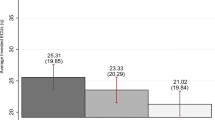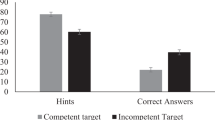Abstract
When students are faced with the decision of whether to assist a peer, they should be sensitive to the potential risks associated with doing so. Two factors associated with risky helping behaviour in the classroom are: (1) the grading practices that are used, and (2) knowledge of a peer’s relative status. Normative (“curved”) grading creates a situation in which peer-interactions are potentially competitive, but it is only those interactions with peers of a similar status that carry the potential for assistance to be costly to oneself. In two studies, we created hypothetical scenarios in which the grading practices (normative or absolute) and peer-status proximity (proximate, distant, or unknown) were manipulated, and asked participants to report their willingness to cooperate with a peer by sharing their notes from an important lecture. We found that when normative grading was used, individuals were less willing to assist a peer when they knew that the peer’s status was proximate to their own. There was also less cooperation when peer status was unknown, under normative grading, which is consistent with a risk-aversion tendency.

Similar content being viewed by others
Notes
Qualifications were used to ensure high-quality data; individuals could not participate unless they had completed at least 100 MTurk tasks with an approval rate of at least 95%.
Qualifications were used to ensure high-quality data; individuals could not participate unless they had completed at least 100 MTurk tasks with an approval rate of at least 95%. A script was also used to ensure that none of the participants had previously participated in Study 1.
References
Ames, C. (1992). Classrooms: Goals, structures, and student motivation. Journal of Educational Psychology, 84(3), 261–271. https://doi.org/10.1037//0022-0663.84.3.261.
Burleigh, T. J., & Meegan, D. V. (2013). Keeping up with the joneses affects perceptions of distributive justice. Social Justice Research, 26(2), 120–131. https://doi.org/10.1007/s11211-013-0181-3.
Burleigh, T. J., Rubel, A. N., & Meegan, D. V. (2017). Wanting ‘the whole loaf’: Zero-sum thinking about love is associated with prejudice against consensual non-monogamists. Psychology and Sexuality, 8(1–2), 24–40. https://doi.org/10.1080/19419899.2016.1269020.
Carnevale, P. J. D., & Pruitt, D. G. (1992). Negotiation and mediation. Annual Review of Psychology, 43(1), 531–582. https://doi.org/10.1146/annurev.ps.43.020192.002531.
Church, M. A., Elliot, A. J., & Gable, S. L. (2001). Perceptions of classroom environment, achievement goals, and achievement outcomes. Journal of Educational Psychology, 93(1), 43–54. https://doi.org/10.1037//0022-0663.93.1.43.
Deutsch, M. (1949). A theory of co-operation and competition. Human Relations, 2(2), 129–152. https://doi.org/10.1177/001872674900200204.
Deutsch, M. (2006). Cooperation and competition. In M. Deutsch, P. T. Coleman, & E. C. Marcus (Eds.), The handbook of conflict resolution: Theory and practice (pp. 23–42). Jossey-Bass.
Garcia, S. M., & Tor, A. (2007). Rankings, standards, and competition: Task vs. scale comparisons. Organizational Behavior and Human Decision Processes, 102(1), 95–108. https://doi.org/10.1016/j.obhdp.2006.10.004.
Garcia, S. M., Tor, A., & Gonzalez, R. (2006). Ranks and rivals: A theory of competition. Personality and Social Psychology Bulletin, 32(7), 970. https://doi.org/10.1177/0146167206287640.
Kahneman, D., & Frederick, S. (2002). Representativeness revisited: Attribute substitution in intuitive judgment. In T. Gilovich, D. Griffin, & D. Kahneman (Eds.), Heuristics of intuitive judgment: Extensions and applications (pp. 1–30). New York: Cambridge University Press.
Kahneman, D., & Frederick, S. (2005). A model of heuristic judgment. In K. J. Holyoak & R. G. Morrison (Eds.), Cambridge handbook of thinking and reasoning (pp. 267–293). Cambridge: Cambridge University Press.
Kahneman, D., & Tversky, A. (1979). Prospect theory: An analysis of decision under risk. Econometrica, 47(2), 263–291. https://doi.org/10.2307/1914185.
Levy, I., Kaplan, A. V. I., & Patrick, H. (2004). Early adolescents’ achievement goals, social status, and attitudes towards cooperation with peers. Social Psychology of Education, 7(2), 127–159. https://doi.org/10.1023/b:spoe.0000018547.08294.b6.
Meece, J. L., Anderman, E. M., & Anderman, L. H. (2006). Classroom goal structure, student motivation, and academic achievement. Annual Review of Psychology, 57, 487–503. https://doi.org/10.1146/annurev.psych.56.091103.070258.
Meegan, D. V. (2010). Zero-sum bias: Perceived competition despite unlimited resources. Frontiers in Psychology, 1, 1–7. https://doi.org/10.3389/fpsyg.2010.00191.
Midgley, C., Kaplan, A., & Middleton, M. (2001). Performance-approach goals: Good for what, for whom, under what circumstances, and at what cost? Journal of Educational Psychology, 93(1), 77. https://doi.org/10.1037//0022-0663.93.1.77.
Poortvliet, P. M., & Darnon, C. (2010). Toward a more social understanding of achievement goals: The interpersonal effects of mastery and performance goals. Current Directions in Psychological Science, 19(5), 324–328. https://doi.org/10.1177/0963721410383246.
Poortvliet, P. M., Janssen, O., Van Yperen, N. W., & van de Vliert, E. (2007). Achievement goals and interpersonal behavior: How mastery and performance goals shape information exchange. Personality and Social Psychology Bulletin, 33(10), 1435–1447. https://doi.org/10.1177/0146167207305536.
Poortvliet, P. M., Janssen, O., Van Yperen, N. W., & van de Vliert, E. (2009a). The joint impact of achievement goals and performance feedback on information giving. Basic and Applied Social Psychology, 31(3), 197–209. https://doi.org/10.1080/01973530903058276.
Poortvliet, P. M., Janssen, O., Van Yperen, N. W., & van de Vliert, E. (2009b). Low ranks make the difference: How achievement goals and ranking information affect cooperation intentions. Journal of Experimental Social Psychology, 45(5), 1144–1147. https://doi.org/10.1016/j.jesp.2009.06.013.
Porter, C. O. (2005). Goal orientation: effects on backing up behavior, performance, efficacy, and commitment in teams. Journal of Applied Psychology, 90(4), 811. https://doi.org/10.1037/0021-9010.90.4.811.
Rubin, P. H. (2003). Folk economics. Southern Economic Journal, 70(1), 157. https://doi.org/10.2307/1061637.
Urdan, T., & Schoenfelder, E. (2006). Classroom effects on student motivation: Goal structures, social relationships, and competence beliefs. Journal of School Psychology, 44(5), 331–349. https://doi.org/10.1016/j.jsp.2006.04.003.
von Neumann, J., & Morgenstern, O. (1944). Theory of games and economic behavior. Princeton: Princeton University Press.
Zins, J. E., & Elias, M. J. (2006). Social and emotional learning: Promoting the development of all students. In G. G. Bear, K. M. Minke, & A. Thomas (Eds.), Children’s needs III: Development, problems, and Alternatives (pp. 1–13). Bethesda: National Association of School Psychologists.
Author information
Authors and Affiliations
Corresponding author
Rights and permissions
About this article
Cite this article
Burleigh, T.J., Meegan, D.V. Risky prospects and risk aversion tendencies: does competition in the classroom depend on grading practices and knowledge of peer-status?. Soc Psychol Educ 21, 323–335 (2018). https://doi.org/10.1007/s11218-017-9414-x
Received:
Accepted:
Published:
Issue Date:
DOI: https://doi.org/10.1007/s11218-017-9414-x




